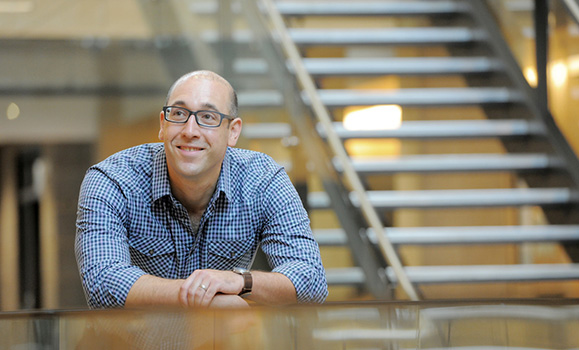¹ū½“ŹÓʵ professor Matthew Schnurr recalls the day that 30 of his students stood up and marched out of his class in protest.
It was late March 2012, and as the students quietly filtered past him and out of the Scotiabank Auditorium in the McCain Building, others in the class looked on, wide-eyed with surprise.
Dr. Schnurr saw it coming, though. Indeed, he had a hand in organizing the protest, which was orchestrated by a coalition of students as part of a simulated negotiation in a course on environment and sustainability that he and Dal colleague Elizabeth De Santo ran together.
The students behind the five-minute protest represented environmental NGOs, indigenous rightsā groups or poorer countries that felt marginalized during the simulated negotiation of the Convention on Biological Diversity. Their objection was to the wording of the final agreement.
āStudents in these roles can get really creative,ā says Dr. Schnurr, an associate professor in International Development Studies (IDS) who uses role-playing in many of his classes as an engaging way to introduce students to complex issues.
Integrating new approaches
Dr. Schnurr's effectiveness in developing and incorporating such an innovative learning experience into his courses and his general excellence as a teacher have earned him a pair of awards from ¹ū½“ŹÓʵ this year: the Academic Innovation Award and the Early Career Faculty Award of Excellence for Teaching.
āItās really nice to get the recognition, but itās also really humbling because being a successful teacher is so much more than just the individual. Itās really a team approach,ā he says, in a nod to his colleagues in IDS and the College of Sustainability, as well as others heās collaborated with since joining Dal in 2008.
Dr. Schnurr says he was inspired to incorporate role-playing into his courses after reflecting on how much he learned as an undergrad taking part in Model U.N. and Model Parliament conferences.
Instead of just throwing around concepts like sustainability, empowerment and climate change in discussions, he says students get to operationalize those terms and look at them through the often-conflicting lenses of different stakeholders in international development.
"Students start to appreciate, in a very small way, these dynamics of poverty and inequity and environmental degradation because they are talking about these things in the first person," says Dr. Schnurr, whose research focuses on the impact of genetically modified crops on African farmers.

Forging connections with students
Schnurr strives to inject new approaches into more traditional assignments like essays, too. Instead of anchoring everything around peer-reviewed scholarship, he sometimes uses news articles, podcasts and videos to amplify complex content in a way that makes it more relevant to students.
In a recent third-year class, for instance, he asked students to listen to a series of episodes of the NPR podcast Planet Money for an assignment on what happens when you value nature in monetary terms. He says it led to some excellent-quality work.
"It's our responsibility to connect with students, so the more effectively we do that the better they are going to understand and the better quality work they are going to produce," he says.
While he admits he's just testing the waters with this sort of teaching, Schnurr says it all fits into his broader belief that students learn more when their professors are relatable.
Inspired learning
Jocelyn Cormack, a Dal IDS grad, says Schnurr's courses forced her to think more critically by giving her a bunch of different ways to think about topics.
She participated in the role-playing simulation in Schnurr's sustainability class one year, taking on the role of Thailand. "Instead of just looking at my own personal views, I got to look at it from a bunch of different perspectives," she says.
Cormack ended up taking four different classes with Schnurr over the course of her degree and says she's not the only student who appreciated the fresh approach.
"Dr. Schnurr is a teacher where you've heard about him before you've even taken a class with him. You know a lot about his teaching style and people recommend him," she says. "Before I had taken any of his class, I had a TA say 'Oh, make sure you take some of Dr. Schnurr's classes. They're some of the best.ā"
Looking to the future
While students tend to enjoy his classes, Dr. Schnurr says there hasn't been a lot of rigorous scholarship on whether or not teaching methods such as role-playing actually improve knowledge retention or help students sharpen their skills.
Heās been striving to change that by developing a series of pre- and post-simulation surveys and self-assessments to help measure the impact of role-playing on everything from how good students are at negotiating to how much they know about U.N. processes.
When heās not trying to measure the effectiveness of his current techniques, Dr. Schnurr is always thinking about what heāll try next.
āThings have changed quite rapidly and itās exciting to think what will happen next,ā says Dr. Schnurr. āI know 15 years from now the kind of teaching weāre doing right now is going to seem so antiquated.ā
This article is part of a series highlighing some of the recipients of ¹ū½“ŹÓʵ's university-wide teaching awards.Ā .

